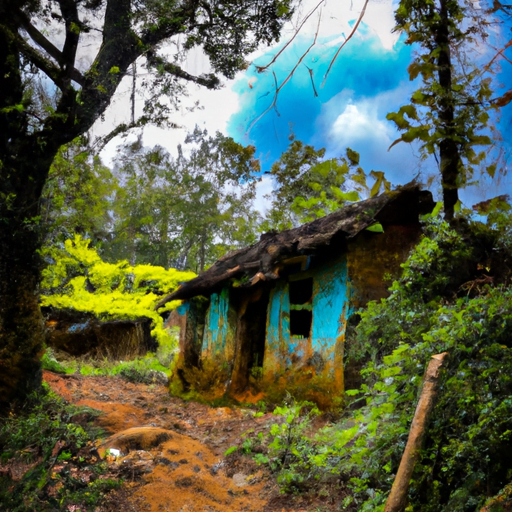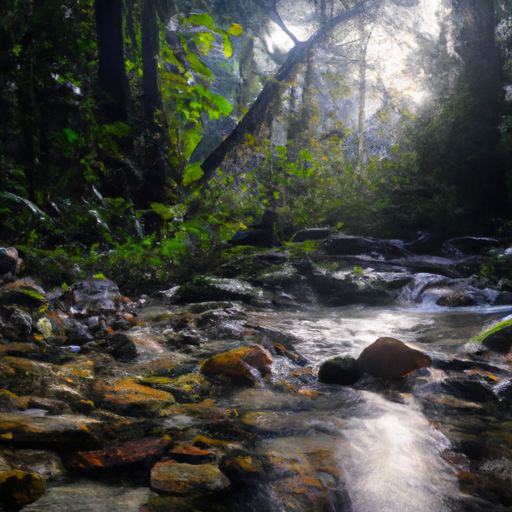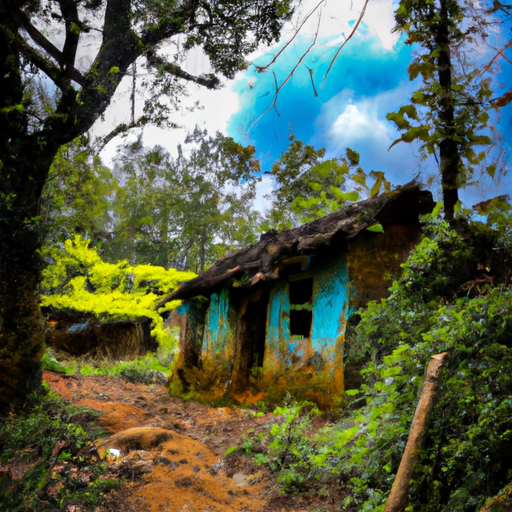Living off the grid – it’s a dream for many of us, right? Imagine being completely self-sufficient, surrounded by nature, and away from the hustle and bustle of everyday life. But where exactly is the best place to go off the grid? Well, let me tell you, my friend, there are so many options out there that it can be quite overwhelming. Don’t worry though, because in this article, we’ll dive deep into this topic and explore the different factors you need to consider when looking for that perfect off-grid retreat.
First things first, when you’re searching for an off-grid retreat, you need to think about the climate. Do you prefer the heat and sunshine, or are you more of a snow and cold weather person? Different climates offer different advantages and challenges when it comes to off-grid living, so it’s important to choose one that aligns with your preferences and needs.
Another crucial factor to consider is the availability of resources. Going off the grid means relying on your own sources of power, water, and food. So, you’ll want to find a location where you have easy access to these resources. For example, being close to a body of water can make it easier for you to generate your own electricity through hydro-power, while having fertile land nearby can provide you with the opportunity to grow your own food.
In addition to climate and resources, you’ll also want to think about the community and amenities available in the area. Are you someone who values solitude and prefers to be completely isolated, or do you want to be part of a like-minded community of fellow off-gridders? Consider what kind of social interaction and support you’re looking for, as well as the proximity to essential amenities like healthcare, grocery stores, and schools, if that’s a concern for you.
So, my friend, as you can see, finding the perfect off-grid retreat requires careful consideration of various factors. In this article, we’ll delve into these factors in more detail, providing you with valuable insights and information to help you make an informed decision. Trust me, by the time you finish reading, you’ll be one step closer to discovering your own little slice of off-grid paradise.

Discovering the Perfect Off-Grid Retreat
Living off-grid has become a popular choice for those seeking a simpler, more sustainable way of life. By disconnecting from traditional utilities and relying on renewable energy sources, individuals can reduce their carbon footprint and embrace self-sufficiency. However, choosing the perfect off-grid retreat can be a daunting task. In this article, we will explore the benefits and challenges of living off-grid, the skills required to create and maintain an off-grid retreat, and factors to consider when choosing the ideal location for your sustainable sanctuary.
Benefits of Living Off-Grid
Living off-grid offers a multitude of benefits, both for individuals and the environment. Firstly, it allows you to break free from the constraints of traditional utilities, giving you the freedom to design and create a lifestyle that aligns with your values. By generating your own electricity through solar panels or wind turbines, you can minimize your reliance on fossil fuels, ultimately reducing your carbon footprint. Additionally, the cost savings associated with living off-grid can be substantial, as you are no longer tied to monthly utility bills.
Furthermore, living off-grid promotes a sense of self-sufficiency. You become more aware of the resources you consume and the waste you produce, fostering a greater appreciation for sustainable practices. By implementing water harvesting and management systems, you can reduce your dependence on municipal water supplies. Likewise, sustainable food production methods such as permaculture and organic farming enable you to cultivate fresh and nutritious produce, reducing your reliance on grocery stores.
Challenges of Living Off-Grid
While living off-grid offers numerous benefits, it is not without its challenges. One of the main obstacles to overcome is the initial cost of setting up an off-grid retreat. The financial investment required to install renewable energy systems, water harvesting systems, and sustainable infrastructure can be significant. However, it is essential to view this as a long-term investment, considering the potential cost savings and the positive impact on the environment.
Another challenge of living off-grid is the need for self-reliance and resilience. Off-grid living often requires individuals to develop a wide range of skills, from building and maintenance to sustainable food production and emergency preparedness. Embracing a self-sufficient lifestyle means taking responsibility for ensuring your basic needs are met and being prepared for any unforeseen circumstances.
Skills Required for Living Off-Grid
Living off-grid necessitates a variety of skills to create and maintain a sustainable retreat. Building and construction skills are essential for designing and constructing your off-grid home. Familiarity with sustainable building materials and techniques is crucial to minimize energy consumption and environmental impact.
Additionally, knowledge of renewable energy systems is vital for generating your own power. Understanding how to select and install solar panels, wind turbines, and battery storage systems is necessary for harnessing renewable energy effectively. Regular maintenance and monitoring of these systems are also essential to ensure optimal performance.
Water management skills are another key aspect of off-grid living. Implementing rainwater collection and filtration systems, drilling wells, and creating water storage solutions are necessary to ensure a reliable and sustainable water supply.
Finally, sustainable food production skills are vital for cultivating your own food. Creating a permaculture design, employing organic farming techniques, and raising livestock and poultry can provide a sustainable source of nourishment.
Finding the Perfect Off-Grid Retreat
Now that you understand the benefits of living off-grid and the skills required, let’s explore how to find the perfect off-grid retreat.
Researching Off-Grid Retreat Locations
When searching for an off-grid retreat location, thorough research is paramount. Consider geographical factors such as climate, topography, and natural resources. Certain regions may provide more opportunities for renewable energy generation, while others may offer better conditions for sustainable food production.
Furthermore, consider the accessibility of the location. While the idea of a secluded off-grid retreat may be appealing, easy access to basic necessities such as healthcare, groceries, and educational institutions may be essential, especially if you have a family.
Factors to Consider When Choosing an Off-Grid Retreat
When evaluating potential off-grid retreat locations, several factors should be taken into account. Firstly, assess the availability of natural resources such as sunlight and wind. These factors are crucial for generating renewable energy and should be prioritized when selecting a site.
Additionally, consider the land’s suitability for sustaining sustainable food production. Is the soil fertile? Is there adequate space for gardening or livestock raising? These factors are crucial for creating a self-sufficient lifestyle.
Finally, assess the legal and regulatory considerations of the location. Some areas may have restrictions on the size or type of off-grid structures allowed, while others may have zoning ordinances regarding land use. Ensure you are familiar with local regulations to avoid potential conflicts or limitations.
Evaluating Access to Basic Necessities
While living off-grid promotes self-sufficiency, it is important to consider access to basic necessities. Evaluate the proximity to emergency services, healthcare facilities, and grocery stores. While the goal is to be self-reliant, access to these essential services is crucial in case of emergencies or unforeseen circumstances.

Building and Setting Up Your Off-Grid Retreat
Once you have selected the ideal off-grid retreat location, the next step is to design and build your sustainable sanctuary.
Designing Your Off-Grid Retreat
A well-designed off-grid retreat maximizes energy efficiency and incorporates sustainable features. Consider the layout and orientation of your home to optimize passive solar heating and cooling. Incorporate natural lighting and ventilation to reduce the need for artificial lighting and air conditioning. Additionally, choose a design that allows for future expansion or modifications, as your needs may change over time.
Selecting Sustainable Building Materials
When constructing your off-grid retreat, select environmentally friendly and sustainable building materials. Materials such as reclaimed wood, bamboo, and natural insulation options can reduce the environmental impact and improve energy efficiency.
Installing Renewable Energy Systems
Generating your own power through renewable energy sources is a fundamental aspect of off-grid living. Choose the appropriate renewable energy systems based on the location’s natural resources. Solar panels are a popular choice for harnessing sunlight, while wind turbines can be effective in windy regions. Additionally, invest in high-quality battery storage systems to store excess energy for times when renewable sources are not sufficient.
Implementing Water Harvesting and Management
Water harvesting and management systems are crucial for an off-grid retreat’s sustainability. Install rainwater collection and filtration systems to collect and purify rainwater for domestic use. Drilling a well can provide access to groundwater, but ensure you comply with local regulations and properly maintain the well. Lastly, create a water storage system to store harvested or well water for times when water sources are scarce.
Sustainable Food Production
Sustainable food production is an essential aspect of living off-grid and achieving self-sufficiency. Implementing permaculture design principles can help create a harmonious and productive ecosystem. Utilize organic farming techniques such as crop rotation, companion planting, and natural pest control to cultivate a diverse and resilient food garden.
In addition to plant-based food production, consider raising livestock and poultry. Chickens for eggs, goats for milk, or bees for honey can provide valuable food sources while contributing to the overall sustainability of your off-grid retreat.
Furthermore, take advantage of the surrounding natural environment by learning about wild edibles and foraging. Identify native plants that are safe to consume and educate yourself on sustainable harvesting practices to minimize the impact on the ecosystem.
Off-Grid Water Solutions
Water is a crucial resource for off-grid living. Implementing various water solutions can help ensure a sustainable and reliable water supply.
Rainwater Collection and Filtration
Collecting rainwater can provide a significant amount of water for domestic use. Set up a rainwater collection system using gutters and storage tanks to capture rainwater from the roof. Install a filtration system to remove any impurities before using the water for drinking or cooking.
Drilling a Well
If a reliable groundwater source is available, consider drilling a well. Consult with professionals to determine the feasibility of drilling a well on your property. It is essential to comply with local regulations and maintain the well to ensure water quality and longevity.
Building and Managing a Water Storage System
Storing water is crucial for off-grid living, especially during times of water scarcity. Install water storage tanks or reservoirs to store harvested rainwater or water from a well. Properly managing and maintaining your water storage system is essential to prevent contamination and ensure a reliable water supply.
Off-Grid Sanitation Systems
Implementing sustainable sanitation systems is necessary for maintaining a hygienic and eco-friendly off-grid retreat.
Composting Toilets
Composting toilets are an efficient and sustainable alternative to traditional flush toilets. They convert human waste into nutrient-rich compost, eliminating the need for water-intensive sewage systems. Utilizing composting toilets not only saves water but also contributes to the creation of valuable organic matter for gardening.
Greywater Recycling
Greywater recycling involves capturing and treating wastewater from sinks, showers, and laundry for non-potable use. Installing a greywater recycling system allows you to reuse water for activities such as watering plants or flushing toilets, reducing the demand for freshwater.
Waste Management Strategies
Proper waste management is crucial for maintaining a clean and sustainable off-grid retreat. Implement recycling and composting systems to minimize waste sent to landfills. Reduce packaging waste by purchasing products with minimal packaging or opting for reusable containers. Additionally, learn about local waste disposal regulations and follow proper procedures to minimize environmental impact.
Maintaining Off-Grid Energy
Maintaining your off-grid energy systems is essential for uninterrupted power supply and minimizing the need for external assistance.
Solar Power Maintenance
Regularly inspect and clean your solar panels to optimize energy production. Check for any obstructions or damage that may affect their performance. Additionally, monitor the battery storage system to ensure it is charging and discharging properly.
Wind Turbine Maintenance
If you have wind turbines as part of your renewable energy system, regular maintenance is crucial. Inspect the blades, bearings, and tower for any signs of wear or damage. Clean the turbine to remove dirt and debris that may affect its performance.
Battery Storage and Maintenance
Proper maintenance of battery storage systems is vital for their long-term performance and lifespan. Follow the manufacturer’s instructions for regular monitoring and maintenance. Ensure the batteries are kept in a suitable environment and properly connected to the renewable energy source.
Emergency Preparedness
Living off-grid requires a proactive approach to emergency preparedness. Being prepared for natural disasters or unforeseen events is essential for your safety and well-being.
Creating an Emergency Plan
Develop an emergency plan that includes evacuation procedures, communication methods, and a designated meeting point for your family. Educate yourself and your family on basic survival skills and first aid techniques. Regularly review and update your emergency plan to ensure its effectiveness.
Survival Skills and First Aid
Learning basic survival skills such as fire-making, shelter-building, and foraging can be essential in emergency situations. Additionally, having a basic understanding of first aid can help you respond effectively to injuries or medical emergencies.
Preparing for Natural Disasters
Research the potential natural disasters that can occur in your chosen off-grid retreat location, such as wildfires, hurricanes, or earthquakes. Take necessary precautions to protect your off-grid retreat, including reinforcing structures, creating defensible space, or establishing emergency supply kits.
Community and Off-Grid Living
Living off-grid does not necessarily mean living in isolation. Joining or creating an off-grid community can provide social support, resource sharing, and collaboration on projects.
Joining or Creating an Off-Grid Community
Search for existing off-grid communities that align with your values and goals. Collaborate with like-minded individuals to develop an off-grid community if none exist in your desired location. Engaging with a community can provide opportunities for shared resources, skill exchange, and social connections.
Collaborative Living and Resource Sharing
Off-grid communities often emphasize collaborative living and resource sharing. Pooling resources such as tools, equipment, or land can make off-grid living more affordable and sustainable. Additionally, shared knowledge and skills within the community can contribute to individual growth and overall community resilience.
Resolving Conflicts in Off-Grid Communities
Living in close proximity and sharing resources with others can lead to conflicts. Developing effective communication skills and implementing conflict resolution strategies is essential for maintaining a harmonious community. Encourage open dialogue, respect differing opinions, and foster a supportive and inclusive community environment.
Conclusion
Embarking on an off-grid lifestyle can be a rewarding and fulfilling journey towards sustainability and self-sufficiency. By understanding the benefits and challenges associated with off-grid living, developing the necessary skills, and finding the perfect off-grid retreat location, you can create a sustainable sanctuary that aligns with your values. Remember, living off-grid is a continuous learning process, and with dedication and perseverance, you can embrace a simpler, more intentional way of life. So, where will your off-grid adventure take you?




